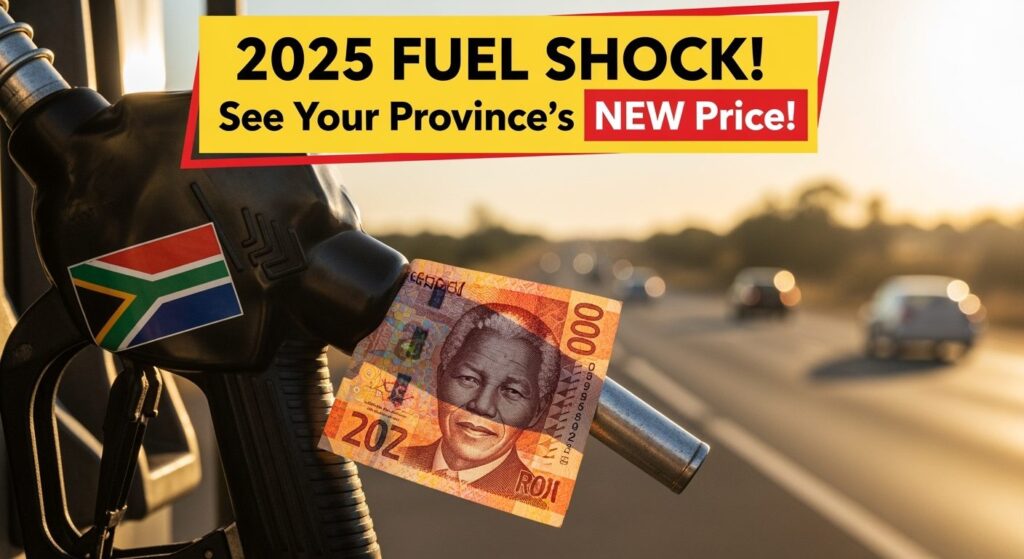South African Fuel Price Increase: As we approach September 2025, South African commuters are bracing for yet another significant fuel price increase. I’ve been analyzing the latest data, and it’s clear that this upcoming adjustment will impact households differently across the nine provinces. The Department of Energy has announced that petrol prices will rise by R2.37 per liter, while diesel will see an increase of R1.98 per liter nationwide. But what does this mean for your daily commute? The effects will vary considerably depending on where you live, with some provinces facing steeper challenges due to longer average commuting distances and different public transport infrastructures.

What Factors Are Driving the September 2025 Fuel Price Increase?
The September 2025 South African fuel price increase stems from several global and local factors. International crude oil prices have surged by 15% in the past quarter, primarily due to ongoing conflicts in major oil-producing regions and OPEC+ production cuts. Domestically, the Rand has weakened against the US Dollar by approximately 8% since June, further amplifying the impact on fuel prices. The government’s fuel levy, which was temporarily reduced last year, has now returned to its full amount, adding an additional R3.85 per liter to petrol prices. Climate change mitigation taxes have also increased by 4.5%, contributing to the overall price hike. These combined factors have created what analysts are calling a “perfect storm” for South African motorists.
How Will Different Provinces Be Affected?
The impact of the September 2025 South African fuel price increase will vary significantly across provinces due to geographical and infrastructural differences. Gauteng residents will see the lowest actual prices despite having the highest population density, with 95 octane petrol reaching R27.89 per liter. Coastal provinces like Western Cape and KwaZulu-Natal will pay slightly less due to reduced transportation costs from ports, with prices around R27.45 per liter. However, rural provinces face the greatest challenge – Northern Cape, Eastern Cape, and Limpopo will see prices exceeding R28.50 per liter due to additional transportation costs to remote areas. Free State, North West, and Mpumalanga fall somewhere in the middle, with prices ranging from R27.95 to R28.20 per liter.
 Weekend Rain Alert September 2025 – Heavy Rainfall to Impact Several South African Regions
Weekend Rain Alert September 2025 – Heavy Rainfall to Impact Several South African Regions
| Province | 95 Octane Price (per liter) |
|---|---|
| Gauteng | R27.89 |
| Western Cape | R27.45 |
| Northern Cape | R28.65 |
When Will Commuters Feel the Full Impact?
The September 2025 fuel price increase will take effect at midnight on September 3rd, but the full economic impact won’t be immediate. Initially, commuters will notice the direct cost at the pump, but secondary effects will ripple through the economy over the following 4-6 weeks. Public transport fares are expected to adjust by mid-September, with minibus taxis likely increasing fares by 8-12% depending on the route and province. Bus companies have announced they’ll implement a 6% fare increase from October 1st. E-hailing services have already updated their apps to reflect a “fuel surcharge” that will activate automatically when the price change occurs. For the average commuter, these combined increases could add R350-R750 to monthly transportation expenses, depending on commuting distance and mode of transport.
Why Rural Commuters Will Bear the Heaviest Burden
Rural commuters across South Africa will face disproportionate challenges from the September 2025 fuel price increase. With limited public transportation options and longer distances to travel, rural residents often have no alternative but to use private vehicles or pay premium prices for the limited transport services available. In provinces like Limpopo and Eastern Cape, where many workers commute to urban centers, the fuel price increase could consume up to 35% of some households’ monthly income. The situation is particularly dire in areas where informal transport networks operate without subsidies. Additionally, the ripple effect on food prices will hit rural areas harder, as transportation costs make up a larger percentage of goods’ final prices in remote locations. Have you considered how these increases might affect food security in these vulnerable communities?
 Youth Support Grant R12,500 September 2025 – Applicants Advised to Prepare Documents Early
Youth Support Grant R12,500 September 2025 – Applicants Advised to Prepare Documents Early
Real Impact on an Average Family
Consider the Mokoena family from Polokwane in Limpopo. Mr. Mokoena commutes 45km daily to his workplace, using approximately 300 liters of fuel monthly. With the September 2025 South African fuel price increase, his monthly fuel bill will rise from R7,950 to R8,660 – an additional R710 per month. His wife, who runs a small catering business, will need to increase her prices to cover the rising cost of delivering food to clients. Their daughter, a university student who relies on minibus taxis, will see her monthly transport costs rise by R200. In total, this single family faces over R1,000 in additional monthly expenses directly attributed to the fuel price increase – a significant burden on their household budget that will require difficult adjustments to their spending priorities.



